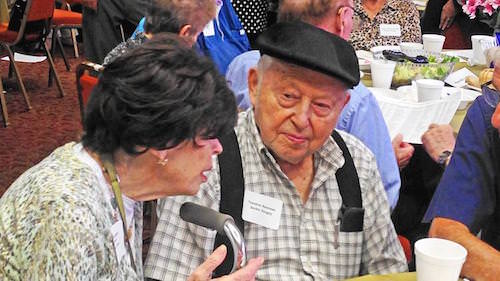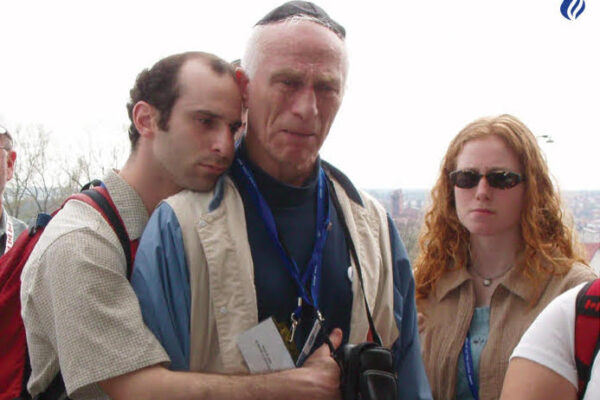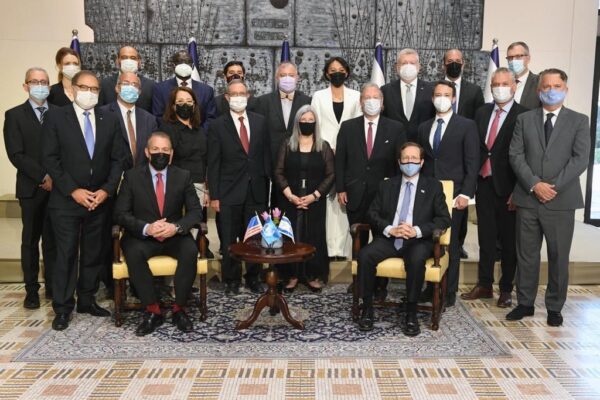
Holocaust survivor Theadore Reichman at a recent AJFCS Café Europa social event. A new federal grant for Holocaust survivors is causing some debate as to whether or not it is what Holocaust survivors really need. (Submitted photo)
In the past month, it was announced by the U.S. federal government that $2.8 million in federal grants has been released to 23 Jewish social-service agencies around the country to help caregivers and medical professionals give support to aging Holocaust survivors.
Locally, the Jewish social-service agencies involved include the Ferd & Gladys Alpert Jewish Family & Children’s Service of Palm Beach County in West Palm Beach and Jewish Community Services of South Florida in North Miami Beach.
This grant marks the first time that the United States federal government has allocated funds to Jewish agencies for social services for Holocaust survivors.
The goal of the grant is to advance care to survivors and their families through a “person-centered, trauma-informed (PCTI) approach.”
PCTI care, according to a recent Alpert Jewish Family & Children’s Service (AJFCS) press release, provides unique mental health trauma interventions and specific outreach and services to caregivers of survivors and assistance to survivors from the Former Soviet Union (FSU).
Of more than 100,000 Holocaust survivors in the United States, according to the release, almost 25 percent are 85 or older and the same percentage lives in poverty. In addition, traumatic experiences endured during the Holocaust have made a lasting impact on survivors, resulting in poor physical and mental health as well as social isolation.
Funds provided by the grant, according to the release, will enhance Holocaust survivor cultural competence training for healthcare, financial, legal and mental health professionals.
“The added services that this grant provides will have a lasting impact on local survivors of the Nazi atrocities,” said Hal Gotchall, AJFCS board member and a member of the AJFCS Holocaust Advisory Committee, in the release. “Although you can’t put a price tag on peace and comfort, this grant is a giant step in the right direction.”
Among the services the grants will allow the agencies to provide are:
•Hiring part-time, Russian-speaking case managers for increased support to FSU Holocaust survivors and their families.
•Creating teams of trauma specialists to serve caregivers of Holocaust survivors as well as second-generation family members.
•Providing in-home mental health services to reduce the general resistance survivors express about accessing more formal mental health services.
•Hiring full-time Benefits and Resources Specialists to expedite requests for information and services.
“Due to limited resources and staff, there has been less focus on cultural competence training and best practices serving Holocaust survivors in our area,” said Harvey Segel, AJFCS board chairman, in the release. “This grant will significantly enhance our services and ensure that all survivors receive the care and assistance they deserve.”
However, Holocaust survivor Jack Rubin of Boynton Beach — a member of the AJFCS Holocaust Advisory Committee (and a member of the executive committee of the Holocaust Survivors Foundation USA) — cautions against being too excited by this new program and attempted to put it in perspective in a recent email:
Rubin wrote: “The Jewish Federations of North America and the Obama-Biden Administration have been relentlessly promoting a new program channeling federal funds into programs that are supposed to assist Holocaust survivors— with $12.5 million in federal dollars spread out over five years, for a total of $2.8 million per year.
“Holocaust survivors and survivors’ families are extremely upset about the self-congratulatory tone of this public relations campaign because the funds involved are minimal and they are not even earmarked for actual services for survivors.
“The program provides grants for ‘person-centered, trauma-informed supportive services for Holocaust survivors.’ No one understands what that really means, except we know the money is not to be used for medicine, dentures, home care, food, or other life-sustaining services.
“It is important to add that survivors are offended by the very idea that U.S. taxpayers should bear any special burden for providing the resources to meet survivors’ unique medical and mental health care needs.
“That burden should fall on Germany and corporate profiteers like the Allianz and Generali insurance companies (and others) who pocketed billions of dollars defrauding Holocaust victims’ families.
“Nazi Germany caused the unique medical and mental health problems survivors face today, and today’s German government must take full responsibility for the harms it caused.
“It is truly sad that our ‘leaders’ are bragging about this program, because in reality it perpetuates the suffering of tens of thousands of Holocaust survivors in desperate need.”
Jenni Frumer, CEO of AJFCS, commented that Rubin is “an incredibly compassionate man and a relentless advocate for Holocaust survivors — spending much of his own time, energy and finances to help meet the needs of those who need the most help.”
And while Frumer understands Rubin’s disappointment in the federal program, she still maintains that the program will be beneficial for Holocaust survivors.
Frumer concluded: “This program will help those in the medical field as well as caregivers meet the needs of Holocaust survivors. Never again will a medical provider ask a Holocaust survivor why they couldn’t fill out a family history page; or mistake the tattoo on their arm for a telephone number; or have a difficult time understanding a survivor’s horrible reaction to hearing moans coming from the next hospital bed.
“This program will help meet the needs of Holocaust survivors with their unique trauma-related aging issues.”
For more information about Alpert Jewish Family & Children’s Service, visitwww.jfcsonline.com or call 561-684-1991.
For more information about Jewish Community Services of South Florida, visitwww.jcsfl.org or call 305-899-1587.








